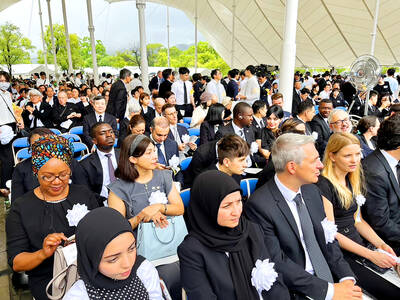China and Japan toned down the rhetoric yesterday, but both said it was up to the other to take steps to repair relations damaged by the detention of a fishing captain and a verbal fight over disputed islands.
China’s Ministry of Foreign Affairs said Tokyo had to make the first move to put diplomatic ties back on track after nearly three weeks of bitterness since Japan detained the fishing captain after his boat and two Japanese patrol boats collided near islands in the East China Sea.
“If Japan values its relationship with China, it should take concrete action to repair ties,” ministry spokeswoman Jiang Yu (姜瑜) told a regular news conference. When asked what specific actions Japan had to take, Jiang would not say.
“Safeguarding bilateral relations requires the two sides to meet halfway and requires Japan to take candid and practical actions,” she said.
She urged Tokyo to “stop its stalking or disruption of Chinese fisheries law enforcement management boats” patrolling the disputed waters, but offered no other specifics on what steps should be taken.
Tokyo said Japanese Prime Minister Naoto Kan had no plans to meet with his Chinese counterpart at an ASEAN-EU summit in Brussels next Monday and Tuesday.
Japanese Foreign Minister Seiji Maehara said Tokyo was “not taking any action” to arrange talks for the two leaders.
“My impression is that it would be difficult for such talks to be arranged,” he said.
Maehara welcomed Kan’s decision to attend the meeting, reversing an earlier plan to miss it, because it is important for Japan to give the rest of the world a fairer picture of developments since the collision.
Chief Cabinet Secretary Yoshito Sengoku also told reporters that conditions had not been met for a meeting with Chinese Premier Wen Jiabao (溫家寶), reiterating it was up to China to repair relations.
Wen and Kan did not meet in New York last week when both attended a UN gathering.
Kan’s government has come under fire at home for its decision last Friday to release the fishing boat captain amid intense Chinese pressure.
His release failed to ease tensions after China demanded an apology for his detention and compensation over the weekend.
Tokyo countered by demanding that Beijing pay for damage to the patrol boats from the collisions near the Diaoyutai Islands (釣魚台), which the Japanese call Senkaku. Japan controls the islands but China and Taiwan also claim them.
Meanwhile, a top Japanese financial official said China’s ban on shipments to Japan of rare-earth metals crucial for advanced manufacturing threatens to undermine the Japanese economy.
Japanese trading company officials say China halted exports to Japan last Thursday of rare earths — exotic metals that are used in magnets, computer disk drives, components for hybrid cars and other high-tech products. Chinese officials denied there was a ban.
“The de-facto ban on rare-earths export that China has imposed could have a very big impact on Japan’s economy,’’ Economic and Fiscal Policy Minister Banri Kaieda said. “We need to restore Japan-China ties, especially economic exchanges, as soon as possible.”

DEFENSE: The first set of three NASAMS that were previously purchased is expected to be delivered by the end of this year and deployed near the capital, sources said Taiwan plans to procure 28 more sets of M-142 High Mobility Artillery Rocket Systems (HIMARS), as well as nine additional sets of National Advanced Surface-to-Air Missile Systems (NASAMS), military sources said yesterday. Taiwan had previously purchased 29 HIMARS launchers from the US and received the first 11 last year. Once the planned purchases are completed and delivered, Taiwan would have 57 sets of HIMARS. The army has also increased the number of MGM-140 Army Tactical Missile Systems (ATACMS) purchased from 64 to 84, the sources added. Each HIMARS launch pod can carry six Guided Multiple Launch Rocket Systems, capable of

TRAJECTORY: The severe tropical storm is predicted to be closest to Taiwan on Wednesday and Thursday, and would influence the nation to varying degrees, a forecaster said The Central Weather Administration (CWA) yesterday said it would likely issue a sea warning for Tropical Storm Podul tomorrow morning and a land warning that evening at the earliest. CWA forecaster Lin Ting-yi (林定宜) said the severe tropical storm is predicted to be closest to Taiwan on Wednesday and Thursday. As of 2pm yesterday, the storm was moving west at 21kph and packing sustained winds of 108kph and gusts of up to 136.8kph, the CWA said. Lin said that the tropical storm was about 1,710km east of Oluanpi (鵝鑾鼻), Taiwan’s southernmost tip, with two possible trajectories over the next one

Tropical Storm Podul strengthened into a typhoon at 8pm yesterday, the Central Weather Administration (CWA) said, with a sea warning to be issued late last night or early this morning. As of 8pm, the typhoon was 1,020km east of Oluanpi (鵝鑾鼻), Taiwan’s southernmost tip, moving west at 23kph. The storm carried maximum sustained winds of 119kph and gusts reaching 155kph, the CWA said. Based on the tropical storm’s trajectory, a land warning could be issued any time from midday today, it added. CWA forecaster Chang Chun-yao (張竣堯) said Podul is a fast-moving storm that is forecast to bring its heaviest rainfall and strongest

CRITICISM: It is deeply regrettable that China, which is pursuing nuclear weapons, has suppressed Taiwan, which is pursuing peace, a government official said Representative to Japan Lee Yi-yang (李逸洋) yesterday accused Beijing of interference after Taiwan’s official delegation to the Nagasaki Peace Memorial Ceremony in Japan was assigned seating in the “international non-governmental organizations [NGO]” area. “Taiwan is by no means an international NGO, but a sovereign nation that is active on the international stage,” Lee said. Lee and Chen Ming-chun (陳銘俊), head of the Taipei Economic and Cultural Office (TECO) in Fukuoka, attended the ceremony in Nagasaki yesterday, which marked the 80th anniversary of the atomic bombing of the city. That followed Lee’s attendance at the Hiroshima Peace Memorial Ceremony on Wednesday